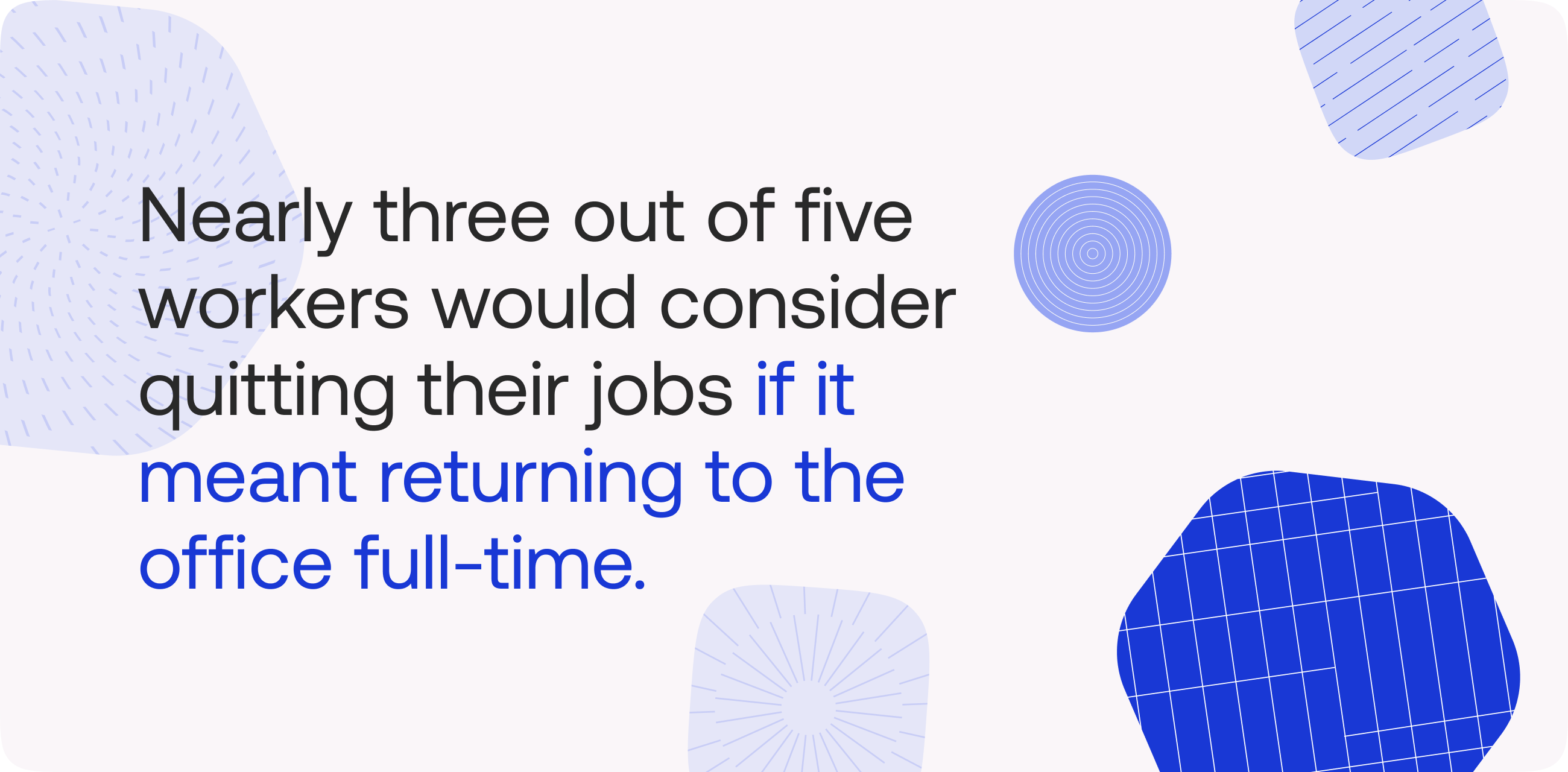
Parents are more likely to change jobs if remote is no longer an option
While 82% of those surveyed agree remote work is the future, parents are more likely to ensure remote work is their immediate future.
According to the 2021 Remote Work Report by Qatalog and GitLab, 58.5% of parents said they would consider leaving their co-located company for a remote job vs 46.3% of nonparents. 30% of parents in the US and UK also reported they’d search for a new remote job if their current company no longer allowed remote work post-COVID-19 pandemic vs 24% of nonparents.
These findings are consistent with a similar survey, except parents expressed an even higher commitment to remote work: 61% said they’d want to work remotely full-time, and 62% said they’d quit their job if they couldn’t continue working remotely for their current company.
Parents have less to gain from being in-office and more to gain from working remotely from home.
For Ryan Burke, Qatalog CRO and dad of two, the advantages of being in the office — face time with leadership, developing work friendships, camaraderie — are more vital to those earlier in their career. Therefore parents, who tend to skew older and presumably have been in the workforce longer, have less to gain from being in the office than nonparents.
“I prioritize the time I want to spend with the people who matter most, my family,” he says. “I can still make time for social interactions at work, but it does not have to be the driving force for a new job.”
Ryan also touched on another important point: the family is easier to prioritize when working at home. Home is where parents see their family, whereas home for nonparents is primarily a place of rest.
Dads are more likely than moms to change jobs if remote is no longer an option
The Remote Work Report also showed that dads — not moms — were more attached to remote working: 33% of dads in the US and UK would change jobs if their company no longer allowed remote work post-COVID vs. 28% of moms.
The pandemic has given many dads their first opportunity to work remotely and realize what they were missing. Leo Mendoza, Director of Engineering at Qatalog and dad of one, agrees: “In my opinion, because of the pandemic, dads have now gotten a taste of what it’s like to have a better work/life balance and, in turn, more time with their kid. I can’t imagine anyone taking that away — which is why I’d look for a new remote job if we were forced to co-locate.”
The women I spoke with had a slightly different explanation for the dad/mom divide: women have already been optimizing their careers around their family, so the impact of remote work is big, but not as big as it is for dads. In her book, Invisible Women, Caroline Criado Perez outlines that women are more likely to choose jobs close to home vs. men who tend to have more city-suburb commutes.
Many of the moms I spoke to proactively sought remote opportunities prior to the pandemic. One said she felt “sometimes subtle, sometimes not so subtle biases against balancing work and parent life.” Another mom pointed out that perhaps the women surveyed felt less strongly about remote work because they were considering quitting or cutting their hours, like so many women have been forced to do during the pandemic.
Moving forward: Flexible work policies are the bare minimum and not a panacea
Although initially met with reluctance, many businesses have realized their employees will continue to work when away from the office. Employees, recognizing their ability to continue to perform outside of an office, are overwhelmingly in favor of staying remote or moving to a hybrid work model. And many employees, not just parents, will quit their jobs if they no longer have the flexibility they’ve enjoyed working from home.
That said, providing remote or hybrid work policies will not completely safeguard a company against post-COVID attrition. A flexible work policy is not a panacea.
In order to truly combat workplace inequities that shape our work lives and career trajectories, companies must supplement flexible work with policies that protect the employee experience. A few examples of this could include:
- Mandatory maternity leave and mandatory paternity leave
- Clear vacation policies (no more “unlimited”) where managers are encouraged (required?) to make sure their reports take all their days
- Instituting a maximum number of days you can attend the office per week to avoid in-office bias
- Explicit and accessible job expectations and requirements for promotion
- Scheduling required in-person work at least two weeks in advance and paying for employee travel
- Requiring managers to alert their team well in advance of when they plan to go into the office, so individuals can use this information to determine their own schedules
Make no mistake, overhauling company policies to improve upon our current work reality will require a lot of effort, time, trial, and error. But those are not reasons to avoid change. If the last year has taught us anything, it’s that we’re all a lot more flexible and imaginative than we thought.




